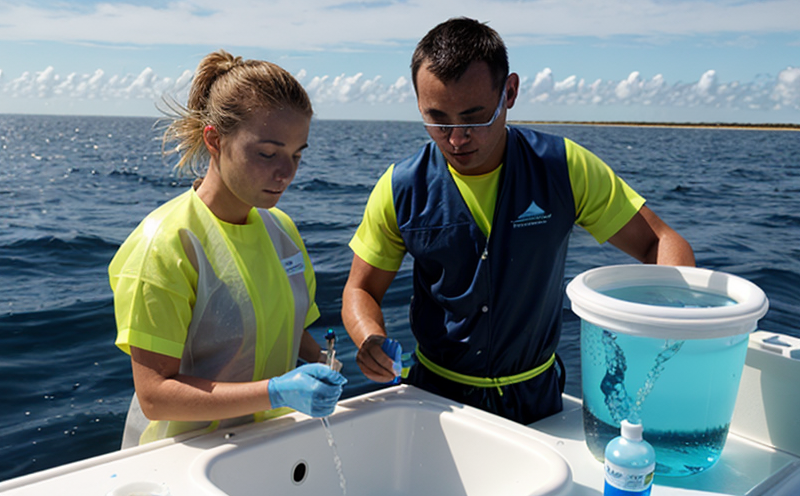EPA 200.8 Metals by ICP-MS Test in Seawater
The EPA Method 200.8 is a critical analytical technique for the determination of metals in seawater, ensuring compliance with environmental regulations and safeguarding public health. This method uses Inductively Coupled Plasma Mass Spectrometry (ICP-MS) to provide accurate, precise, and reliable results on a wide range of metal species.
Seawater contains various metals such as iron, copper, zinc, lead, cadmium, and mercury, which can be harmful if present in excess. The EPA 200.8 method is designed to detect these metals at trace levels, ensuring that water quality standards are met. This test plays a pivotal role in the monitoring of coastal waters, harbors, and other marine environments.
The ICP-MS instrument used for this analysis offers excellent sensitivity and selectivity, making it suitable for detecting even minute quantities of metals. The method involves several steps: sampling, digestion, and then injection into the ICP-MS system. Precise sample preparation is crucial to ensure accurate results, as any contamination or improper handling could lead to erroneous data.
The testing process adheres strictly to EPA Method 200.8 guidelines, which specify the use of certified reference materials (CRMs) and quality control samples to validate the accuracy of the measurements. The method also requires that blanks be analyzed alongside each batch of samples to ensure that any detected metals are indeed from the seawater sample and not from contamination.
Once the metals have been identified, their concentrations can be quantified using calibration curves prepared with CRM solutions. The final results are reported in parts per billion (ppb) or micrograms per liter (µg/L), depending on the scale of the concentration. This level of detail is essential for regulatory bodies and environmental scientists to monitor changes in seawater quality over time.
The EPA 200.8 method is widely recognized as a robust tool for assessing metal contamination in seawater, particularly in areas where industrial activities or natural processes might introduce harmful substances into the marine environment. By providing accurate and consistent data, this test helps to inform decision-making processes that can lead to improved environmental protection and public health.
Seawater testing using EPA 200.8 is not just a regulatory requirement; it's also an essential tool for understanding the ecological impact of human activities on marine ecosystems. The results from this test help scientists identify trends in metal pollution, assess the effectiveness of mitigation strategies, and prioritize areas that require further investigation or intervention.
Moreover, the data obtained through EPA 200.8 testing can be used to support environmental impact assessments (EIAs) for coastal development projects, ensuring that new constructions do not exacerbate existing pollution issues. This proactive approach helps to protect both the marine environment and human health from the adverse effects of metal contamination.
In summary, EPA 200.8 Metals by ICP-MS testing in seawater is a crucial process for maintaining environmental compliance and protecting public health. By adhering to strict protocols and using advanced instrumentation, this method ensures accurate and reliable results that are essential for informed decision-making in environmental management.
Why Choose This Test
- Precise detection of trace metals at ppb levels
- Compliance with EPA Method 200.8 guidelines
- Use of ICP-MS for enhanced sensitivity and selectivity
- Validation through the use of certified reference materials (CRMs)
- Analysis of both metals and organic compounds simultaneously if needed
- Comprehensive reporting with detailed concentration data
International Acceptance and Recognition
The EPA 200.8 Metals by ICP-MS test is internationally recognized for its accuracy and reliability in detecting metal contaminants in seawater. This method has been adopted by numerous countries around the world as part of their environmental monitoring programs, particularly those with significant coastal areas.
ISO/IEC 17025 accreditation ensures that our laboratory adheres to the highest standards of quality and reliability. Our rigorous testing protocols and state-of-the-art instrumentation guarantee that the results we produce meet or exceed regulatory requirements. This level of expertise is crucial for maintaining the integrity of environmental data and ensuring that it can be trusted by regulatory bodies, researchers, and other stakeholders.
Our commitment to international standards extends beyond just EPA Method 200.8; we also adhere to other relevant international guidelines such as ISO 17775:2019 for metal speciation analysis by ICP-MS. By aligning our practices with these globally recognized standards, we ensure that our clients receive results that are comparable and acceptable across different jurisdictions.
Competitive Advantage and Market Impact
The ability to conduct accurate and reliable EPA 200.8 Metals by ICP-MS tests in seawater provides our clients with a significant competitive edge in the market. By offering this service, we not only meet regulatory requirements but also provide valuable insights into environmental conditions that can inform strategic decisions.
Our expertise in this area allows us to offer comprehensive environmental assessments that go beyond simple compliance checking. We help our clients understand the broader implications of metal pollution on ecosystems and human health. This deeper level of insight enables businesses to make more informed choices about their operations, potentially leading to cost savings through improved resource management or reduced risks from potential legal actions.
In addition, by leveraging advanced technologies like ICP-MS, we stay at the forefront of environmental testing innovations. This continuous improvement not only enhances our reputation but also positions us as leaders in the field, attracting clients who value cutting-edge solutions and robust scientific support.





